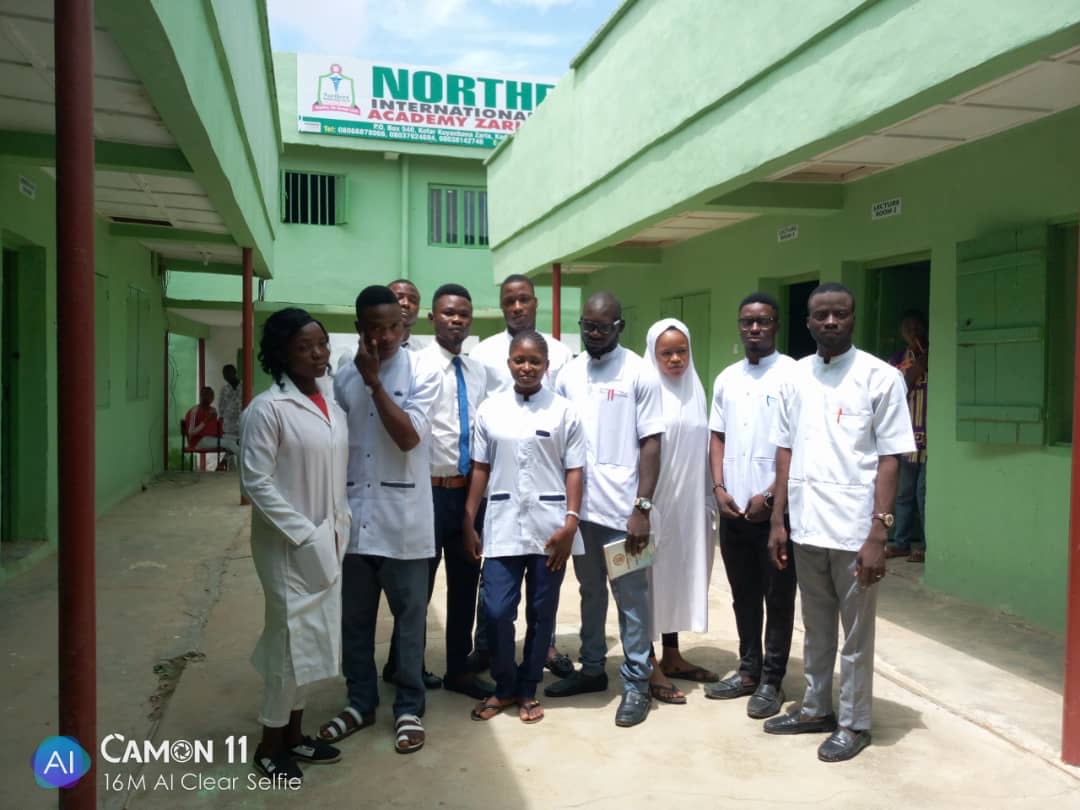Help Desk: +2348162616110

The Department of Community Health at NIHAZ is dedicated to training competent community health practitioners who can deliver essential healthcare services at the grassroots level.
The Department of Community Health is one of the pioneer departments at NIHAZ, established with the aim of strengthening Nigeria’s primary healthcare system. This department is focused on developing skilled professionals who will serve as frontline healthcare providers in both rural and urban communities. With emphasis on disease prevention, health promotion, and community-based interventions, students are prepared to address common health challenges and contribute to improving public health outcomes.
The program follows the guidelines of the Community Health Practitioners Registration Board of Nigeria (CHPRBN). Students undergo three years of structured training comprising classroom lectures, laboratory practice, and supervised clinical postings. The curriculum integrates theoretical foundations in public health, primary healthcare, epidemiology, maternal and child health, and environmental health with hands-on experience in community health centers and hospitals.
Principles of Primary Healthcare and Community Medicine
Maternal, Newborn, and Child Health
Health Education and Promotion
Disease Prevention and Control
Emergency and First Aid Skills
Nutrition and Environmental Health
Research Methods and Community Project Work
Minimum of five (5) credits at not more than two sittings in WAEC/NECO/NABTEB including English Language, Mathematics, Biology/Health Science, Chemistry, and Physics.
Candidates may also be admitted with a recognized Certificate in Community Health or equivalent, as approved by CHPRBN.
Graduates of this program become licensed Community Health Extension Workers (CHEWs) and can work in:
Primary Health Care (PHC) centers
General hospitals and clinics
Non-Governmental Organizations (NGOs) focused on health and development
Public health programs (immunization, maternal health, disease surveillance)
Community health research and education initiatives
This department continues to play a critical role in the improvement of Nigeria’s healthcare delivery system, particularly in underserved areas where professional health services are most needed.
The Department of Health Information Management at NIHAZ is designed to equip students with specialized knowledge in health records management, medical coding, health data analysis, and information technology in healthcare delivery. The demand for reliable health data in Nigeria and globally is increasing, making Health Information Managers indispensable in both public and private health sectors.
The program runs for three years and blends classroom instruction, laboratory simulations, and hospital-based practical training. Students are trained to effectively manage health records, ensure confidentiality, and apply ICT in health information systems.
Principles of Health Records Management
Health Statistics and Data Analysis
Disease Classification and Medical Coding (ICD-10/11)
Health Informatics and ICT Application in Healthcare
Epidemiology and Health Research Methods
Health Information Law and Ethics
Database Management and Hospital Information Systems
A minimum of five (5) credits at not more than two sittings in WAEC/NECO/NABTEB including English Language, Mathematics, Biology/Health Science, Chemistry, and Physics.
Direct entry applicants with a recognized certificate in Health Records or Medical Records may be considered.
Graduates are positioned to work as:
Health Information Officers in hospitals and clinics
Records and Statistics Officers in government health ministries and agencies
Data Managers for NGOs and international health projects
Research Assistants in public health institutions
IT specialists in hospital management information systems
Through this department, NIHAZ contributes to producing professionals who guarantee accurate, reliable, and secure health data for better healthcare planning and policy-making.
The Department of Medical Laboratory Technician prepares students to perform essential laboratory investigations that support disease diagnosis, treatment, and prevention. The department emphasizes both theoretical knowledge and practical laboratory skills to ensure graduates can deliver quality diagnostic services across healthcare institutions.
The Medical Laboratory Technician program runs for three years, integrating classroom teaching, laboratory practice, and clinical postings. Training is supervised under the standards set by the Medical Laboratory Science Council of Nigeria (MLSCN).
Hematology and Blood Grouping
Microbiology and Parasitology
Clinical Chemistry and Chemical Pathology
Histopathology and Cytology Techniques
Immunology and Serology
Laboratory Management and Quality Assurance
Biosafety and Infection Control
At least five (5) credits in WAEC/NECO/NABTEB at not more than two sittings, including English, Mathematics, Biology, Chemistry, and Physics.
Candidates with a certificate in Science Laboratory Technology or related fields may be considered.
Graduates are trained to work in:
Hospital diagnostic laboratories
Private medical laboratories
Research institutes and public health laboratories
Pharmaceutical and biotechnology companies
National disease surveillance and diagnostic programs
This department ensures that NIHAZ graduates contribute to accurate laboratory diagnosis and improved patient care, thereby strengthening the overall healthcare system.
The Department of Pharmacy Technician provides students with essential training to support pharmacists in the delivery of safe and effective pharmaceutical care. The department emphasizes drug dispensing, stock management, compounding, and patient counseling. Pharmacy technicians play a vital role in extending access to essential medicines and ensuring rational drug use in Nigeria’s healthcare system.
The program spans three years, combining academic coursework, laboratory practicals, and supervised clinical practice in hospital and community pharmacies.
Fundamentals of Pharmacology and Pharmaceutics
Pharmaceutical Compounding and Dispensing
Drug Storage, Inventory, and Supply Chain Management
Pharmacy Law, Ethics, and Professional Practice
Pharmacovigilance and Patient Counseling
Basic Clinical Pharmacy and Hospital Practice
Five (5) credits in WAEC/NECO/NABTEB including English Language, Mathematics, Biology, Chemistry, and Physics.
Candidates with prior training in related health programs may be considered for direct entry.
Graduates are qualified to work as licensed Pharmacy Technicians in:
Hospitals and health centers
Community pharmacies and retail outlets
Pharmaceutical companies and drug manufacturing industries
Non-governmental organizations involved in drug distribution and health supply chains
Research institutions and academic settings
The department plays a critical role in building competent pharmacy support staff who enhance pharmaceutical service delivery and promote safe medication practices across healthcare facilities.
This department equips you with essential skills and knowledge in community health. You'll learn to navigate industry challenges, develop practical solutions, and enhance your professional capabilities.
Programs Available
Students Enrolled
Average Rating
Department Head
Leading expert in the field with extensive experience in academia and industry.